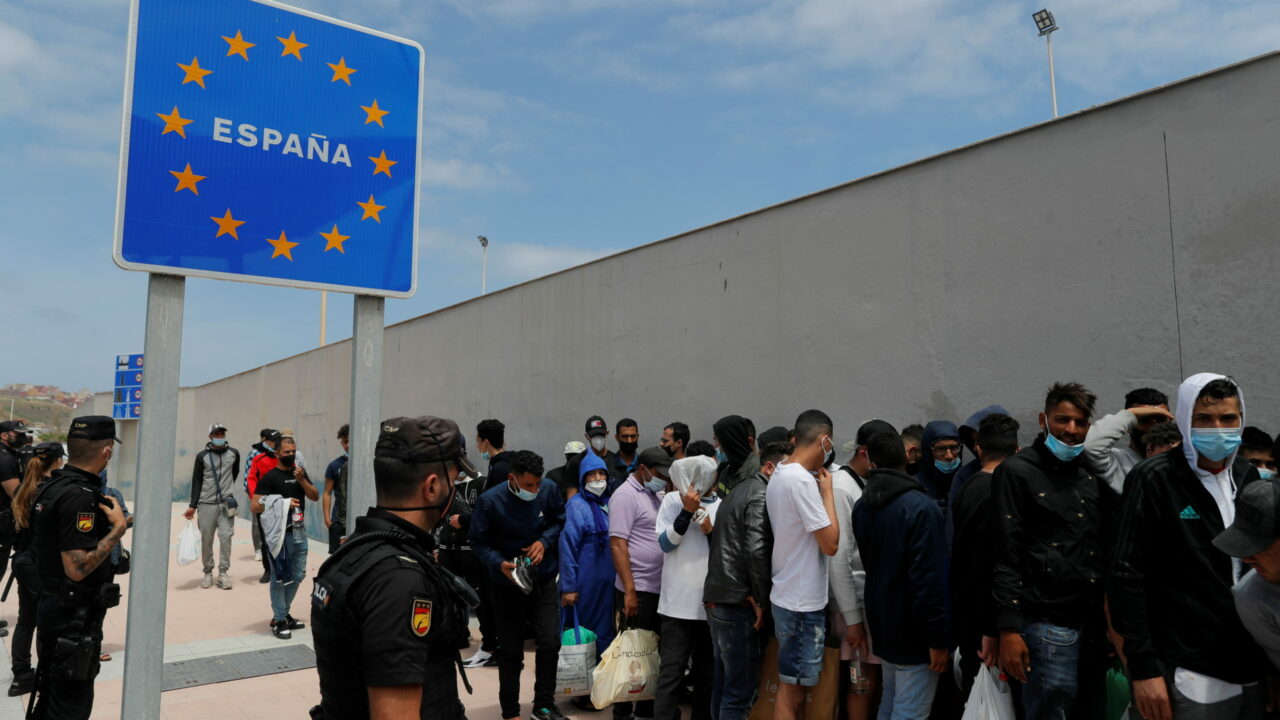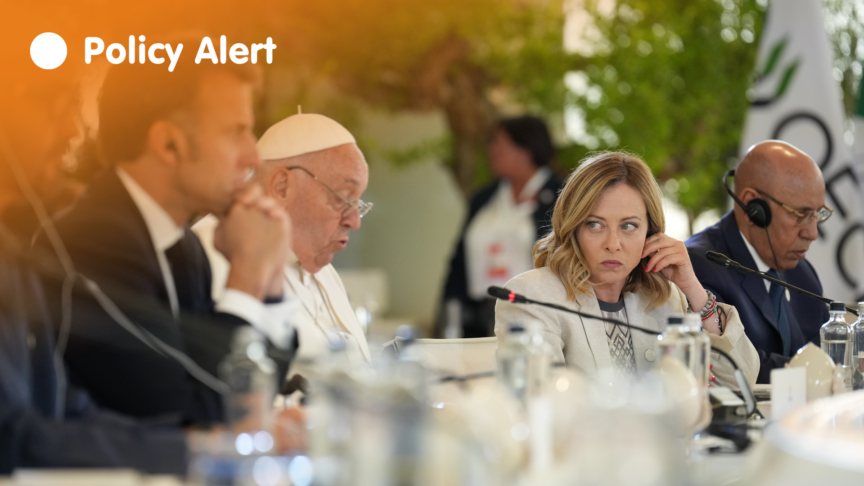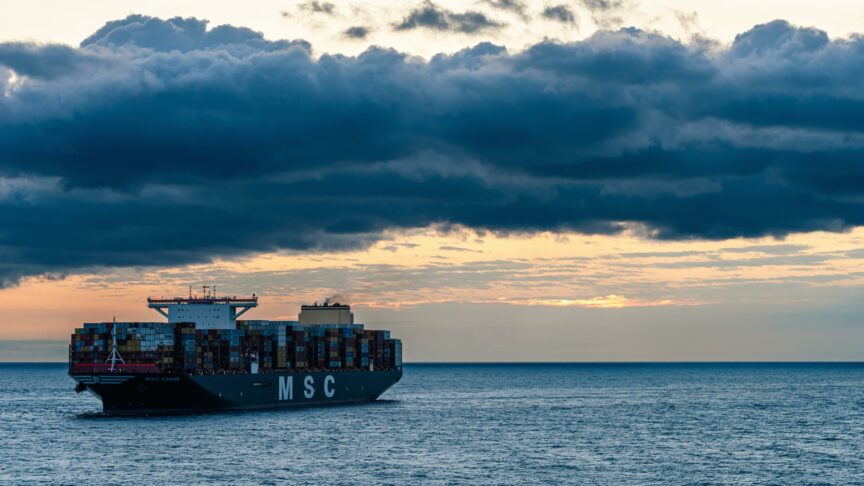This time is different: Spain, Morocco, and weaponised migration
By weaponising migration in Ceuta to advance its Western Sahara claim, Morocco has made several major mistakes. Spain is part of an EU that is not in a joking mood on irregular migration blackmail
Only the most abject regimes traffic in their own citizens to achieve foreign policy objectives. This has just happened at the border of the Spanish city of Ceuta, where the Moroccan authorities have attempted to punish Spain to force a change in its policy on Western Sahara. It has also occurred in Turkey, where President Recep Tayyip Erdogan routinely throws thousands of asylum seekers and refugees at the European Union’s borders whenever he wants to put pressure on the bloc. The practice fits the pattern of the “connectivity wars” – in which states use the interdependence created by globalisation not to prosper but as a weapon of war.
However, this approach is not new. The Moroccan Green March on Western Sahara in November 1975, in which King Hassan II mobilised some 350,000 people, was a milestone in such behaviour. So was the Castro regime’s opening of ports in the 1980 Mariel crisis, when around 125,000 Cubans fled to the United States.
The situation in Ceuta last week – with schools closed, the vaccination campaign suspended, and the army deployed – shows Morocco’s desire to exert as much coercive force on the Spanish government as possible
That Morocco controls the immigration valve according to its interests is well-known. Sometimes, the country has done so to express its objections to specific actions by Spain. At other times, it has done so as a reminder of its presence when it has felt forgotten or ignored. And, on occasion, Morocco has used migration to ease political tension in areas such as the Rif. But this time is different.
Morocco has now stripped its message of all subtlety – and, given the subsequent statements of its authorities, it is clear that it has done so deliberately. When, instead of opening a spigot, one bursts the pipe and encourages thousands of people to march on Ceuta, this generates a crisis that may not be easy to reverse or even control. The situation in Ceuta last week – with schools closed, the vaccination campaign suspended, and the army deployed – shows Morocco’s desire to exert as much coercive force on the Spanish government as possible.
Given that the Moroccan authorities follow Spanish politics, they must know the extent to which the issue of accompanied minors not only energises radical right-wing parties such as Vox but also feeds the anxieties of Spanish citizens. In a single day, Morocco sent 1,500 such minors – equivalent to 15 per cent of all those already under the protection of the Spanish government on the peninsula – into Ceuta. The move, conducted in the knowledge that Spain could not easily return these minors to Morocco, is designed to heighten this political tension.
Another reason why this time is different is that Morocco now wants the impossible. In December 2020, Morocco had great success in making a deal with then-president Donald Trump for US recognition of Moroccan sovereignty over Western Sahara, in exchange for the establishment of diplomatic relations with Israel. However, such recognition not only violates international law and all UN resolutions on the Sahrawi conflict but is useless if neither the EU nor Morocco’s neighbours – especially Spain and Algeria – validate it.
The Moroccan authorities want Spain to join the US and France in acquiescing to a solution to the conflict that involves integrating the territory into Morocco (with an uncertain degree of autonomy and unknown international supervision). But Morocco faces a series of major stumbling blocks, including the position of Spain – which is far from supporting such a claim – and that of many other EU member states. Indeed, the most influential member state, Germany, does not support Morocco’s designs on Western Sahara.
Regardless of what Paris says, other European governments and European institutions cannot violate the numerous legal rulings that deny Morocco sovereignty over Western Sahara. As a political organisation based on law, the EU cannot ignore the pronouncements of either its own or international courts.
Morocco almost certainly hopes that its actions in Ceuta will eventually lead the Spanish government to negotiate over Western Sahara. Otherwise, there is no logic to a gamble that will severely damage bilateral relations for a long time to come. However, King Mohammed VI is making a triple miscalculation in thinking that he can reprise his father’s role in ‘breaking’ Spain with an imitation of the Green March, which the US supported from afar.
Firstly, Spain is not weak. The country’s ruling coalition may be internally fragile, given the divisions between its members over Morocco and Western Sahara. And, due to the sensitivity of bilateral relations with Rabat, Madrid may keep a low profile in its public statements on Morocco. But this is not 1975. Spain is not ruled by a dictator dying in his bed. Nor does it face a transition to democracy that could be threatened by a colonial war. So – regardless of whether Spain was right not to inform Morocco that a Spanish hospital is treating the Polisario Front’s leader, Brahim Ghali, for covid-19 – there is nothing to justify the brutality of Morocco’s response or its decision to play with its citizens lives.
Rabat’s second mistake, which could very well backfire, is that the irregular migrants reaching Ceuta are no supporters of the Moroccan government. Their stated goal is not to ‘Moroccanise’ Ceuta but, if they can, to make Morocco look more like Spain. Since that is impossible, they aspire to Europeanise themselves. Unfortunately, Mohammed VI has created a country with no future and no jobs for young people – so, it is not pride in being Moroccan that pushes people into Ceuta, but the failure of Morocco’s elites. When this adventure is over and thousands of people return to Morocco, they will direct their resentment against their king – not against the Spanish government.
Finally, Morocco’s third mistake is its failure to recognise that Spain is not alone. In 1975 Spain was alone, even in renouncing its colony and defending international law – which would have required it to hand over control of the territory to the United Nations. Spain did not arrive in time, and no one was waiting for it.
Today, Spain is part of an EU whose member states – France first among them, even if it disagrees with Spain over Western Sahara (which is easy for it to do, given its history with Algeria) – are not in a joking mood on irregular migration blackmail. This especially true if a state uses migration as an instrument of coercion, thereby boosting the populist far right. Rabat should listen carefully to statements from EU institutions expressing solidarity with Spain and recalling that Ceuta’s borders belong to the whole of Europe.
Perhaps Morocco has not understood that its dispute over claims to Western Sahara is no longer with Spain but with the EU. For decades, Spanish diplomats have cleverly built up a cushion of interests with Morocco in which multiple levels of cooperation and agreement take the edge off the most sensitive issues. Now one can see that, in case of a crash, Spain has not only a cushion with Morocco but also a European airbag. Morocco is trying to emphasise a historical demand, but it will have a similar experience to the Catalan independence fighters: by going off the track in a last burst of acceleration towards the finish line, Morocco will be back where it started, and bruised.
Morocco has taken off its mask, but its silence has left it naked in the eyes of the EU. This crisis is not yet over, but it is already clear who will lose. Seeing the damage it has inflicted on itself without achieving much, Morocco has now closed the border with Ceuta again. But this is just a temporary truce. Morocco will not cease its effort to coerce Spain and the EU on Western Sahara as it reaches for Trump’s gift. Moroccan observers are discussing a likely next wave of 30,000-50,000 thousand migrants should Spain not change course on Western Sahara and charge Gali for crimes against humanity. But this is not the way diplomacy or the courts work. The Spanish minister of defence has rejected any “blackmail” by Morocco. And Primer Minister Pedro Sánchez has asked Morocco to reconsider its threats and resume border cooperation. The EU will be closely watching Morocco’s next steps – and adjusting its agreement with Rabat accordingly.
This article was originally published in Spanish in El Mundo.
The European Council on Foreign Relations does not take collective positions. ECFR publications only represent the views of their individual authors.



